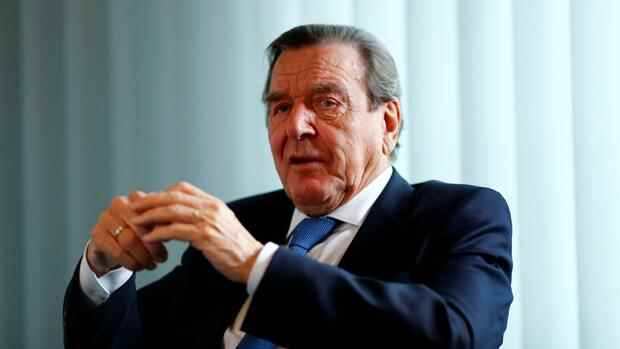The former chancellor has accused Ukraine of “saber rattling” in the conflict with Russia.
(Photo: Reuters)
Berlin After it became known that the former Chancellor Gerhard Schröder was nominated as a candidate for the supervisory board of the Russian state-owned company Gazprom, the call for consequences became louder in Germany.
“If the situation weren’t so serious, the former chancellor’s behavior reminds one of Loriot’s characters Müller-Lüdenscheidt and Dr. Kloebner, who meet in a bathtub because one of the two gentlemen got the room number wrong,” said the chairwoman of the defense committee in the Bundestag, Marie-Agnes Strack-Zimmermann (FDP), the Handelsblatt.
On Twitter, the FDP politician advocated “concretely thinking about withdrawing Gerhard Schröder’s equipment from a former chancellor”. The ex-SPD leader is a shame for the country he is supposed to serve and “willingly allows an autocrat to pay more than well for it. Appanage from the German state is not compatible with this”. Former chancellors and former federal presidents are entitled to offices and staff in Berlin.
Criticism also came from the Union. “We should talk across parties about the withdrawal of office equipment,” demanded the parliamentary manager of the CSU in the Bundestag, Stefan Müller. “Those who let themselves be paid by autocrats don’t need money from German taxpayers.” He was in favor of cross-party rules for the business activities of former chancellors to develop, suggested Müller.
Top jobs of the day
Find the best jobs now and
be notified by email.
The CDU member of the Bundestag Matthias Hauer sees it similarly. With Schröder, the “top German Russia lobbyist” will get the next reward from Kremlin chief Vladimir Putin. “The fact that the German taxpayer also has to financially support this undignified behavior by the former chancellor needs to be put to the test.”
Union suspects the Kremlin’s calculations behind the Schröder nomination
The Russian energy giant Gazprom had announced that Schröder had been nominated for the supervisory board of the state-owned company Gazprom. The Annual General Meeting is therefore planned for June 30th.
Schröder is a friend of Russian President Putin and recently made headlines with pro-Russian statements during the crisis between Moscow and the West.
The ex-Chancellor is Chairman of the Shareholders’ Committee of Nord Stream AG and Chairman of the Board of Directors of Nord Stream 2 AG. Both gas pipelines under the Baltic Sea connect Russia and Germany. Schröder is also the head of the supervisory board at the Russian state energy company Rosneft.
>> Read here: Dialogue instead of sanctions – The German political elite and those who understand Putin
The CDU foreign policy expert Roderich Kiesewetter suspects Schröder’s calculus of the Kremlin behind the Gazprom nomination. This also makes clear “the unclear and peculiar position of parts of the SPD in relation to Russia,” the member of the Bundestag told the Handelsblatt. “Schröder’s nomination can therefore also be seen as a move by Russia to split the German government’s position on stopping Nord Stream 2 as a potential sanction and thus to discredit Germany as a whole.”
The SPD leadership only recently countered the impression that the former chancellor was crossing the line of the party leadership on the Russia question with his Ukraine statements. SPD co-leader Lars Klingbeil pointed out that the social democrats in power today agree that the escalation is currently clearly coming from Russia.
With regard to Schröder and the Ukraine debate, Chancellor Olaf Scholz also made it clear who is in charge of the topic. “If I understand the constitutional order of the Federal Republic of Germany correctly, there is only one Chancellor, and that’s me,” said Scholz. The Prime Minister of Rhineland-Palatinate, Malu Dreyer (SPD), confirmed in the “Rheinische Post” on Saturday that she did not know anyone in the party who shared Schröder’s views.
More: “Make the Russian economy even more fragile” – EU wants to stop Moscow with capital freezes and tech embargo
